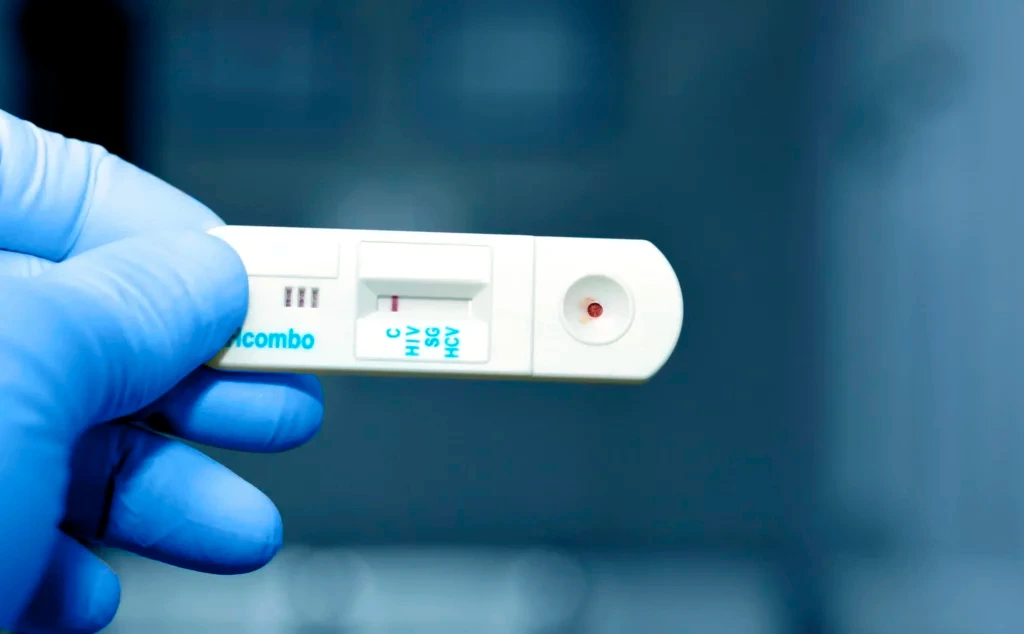HIV testing is an essential tool for the early diagnosis of this sexually transmitted disease, and there are currently several types of tests available, each with its own specific characteristics.
How to Know If You Have HIV
Early HIV detection is crucial for starting appropriate treatment and preserving health. If you have been in a high-risk situation, it is crucial to get tested. Below, we will discuss each type of HIV test.
Rapid HIV Test
The rapid HIV test uses reactive strips to detect the virus. Results are typically available in under 30 minutes. Generally, two tests are required to confirm an HIV diagnosis.
ELISA Test
The ELISA test (Enzyme-Linked Immunosorbent Assay) is a widely used technique for HIV detection. It aims to identify antibodies produced by the immune system in response to the virus and is typically used as a screening test to determine the potential presence of HIV.
Antigen and Antibody Tests
These are performed through a blood test.
- Antigens are substances from the virus itself (in this case, HIV) and can be detected shortly after infection.
- Antibodies develop after a person is exposed to HIV, but may take weeks to months to become detectable.
These tests can give a positive result between two to six weeks after exposure.
Antibody Test
This test analyzes only the presence of HIV antibodies in the blood or oral secretions (saliva). These tests typically give a positive result between 3 to 12 weeks after exposure.
Nucleic Acid Test (NAT)
This test directly detects the presence of the virus in the blood, measuring the viral load. It is performed via a blood sample.
Western Blot
The Western Blot test is a lab technique that detects specific proteins in the blood. It is currently the primary confirmatory test for an HIV diagnosis.
How Long After Exposure Can HIV Be Detected?
No HIV test can detect the virus immediately after infection. This is due to the window period, the time between exposure and the moment when the virus becomes detectable.
The detection time depends on the type of test:
- Antibody tests: 23 to 90 days after exposure
- Rapid antigen/antibody tests: 18 to 90 days after exposure
- Laboratory antigen/antibody tests using blood: 18 to 45 days
- Nucleic acid test (NAT): 10 to 33 days after exposure
However, if you believe you’ve been exposed within the last 72 hours, some medications known as post-exposure prophylaxis (PEP) can be used. It is very important that if you believe you may have been exposed to the virus, you seek medical attention from a specialist immediately so they can advise you on how to proceed.
When to Get an HIV Test?
The right time to get tested depends on your risk factors. It’s recommended to get tested at least once a year if:
- You’ve had sex with someone who is HIV-positive
- You’ve had more than one sexual partner since your last test
- You share needles, syringes, or other drug-injection equipment
- You’ve been diagnosed with another sexually transmitted infection (STI)
- You’ve been treated for tuberculosis or hepatitis
- You’ve had sex with someone who falls into any of the categories above
- You’ve had sex with someone whose sexual history is unknown to you
If you have a more active sexual life with multiple partners, getting tested every 3 to 6 months may be beneficial, depending on your lifestyle and preferences.
At the ABC Medical Center’s Clinical Laboratory Area, we can provide you with specialized care. Contact us today!
Fuentes
Secretaría de Salud, PAHO, Cruz Roja



